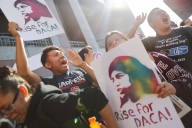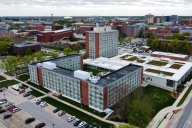You have /5 articles left.
Sign up for a free account or log in.
College students might appreciate free speech in the abstract, but question them on more granular issues, and their support softens, according to a new survey.
The Foundation for Individual Rights in Education (FIRE), a prominent civil rights watchdog group, released the results of its new survey on student free speech Wednesday, a summary of the opinions of 1,250 students at two- and four-year institutions across the country.
While most students supported the principles of campus free expression, some of their answers seemed to contradict this in some way. For instance, while 93 percent of the students indicated that colleges should invite a variety of guest speakers to campus, 78 percent of those students who identified on the political spectrum as “very liberal” believe that invitations should be rescinded in some cases -- 38 percent of “very conservative” students also backed an invitation being withdrawn in certain circumstances.
About 69 percent of students over all thought that a speaker should be disinvited if they have made racist comments.
Most students indicated they wouldn’t try to block an event in any way -- about 5 percent said they would take down fliers advertising a speaker, 4 percent said they might try to stop other students from attending a talk, 2 percent would try to disrupt an event with noise and only 1 percent said they might resort to violence.
“We’ve seen more students prone to using disruptive actions, and we did not find that” in the survey, Nico Perrino, FIRE’s communications director, said of recent incidents on college campuses. “It may have been that we’re seeing a vocal minority. That statistic to me is heartening.”
Shouting down controversial speakers has of late become much more common on campuses. At Texas Southern University Monday, a conservative Texas state lawmaker, Representative Briscoe Cain, was unable to address students after a protest drowned him out. The president of the University of Oregon, Michael Schill, couldn’t give his State of the University address last week after student protests interrupted him, and late last month, at the College of William & Mary, students associated with Black Lives Matter blocked an American Civil Liberties Union official from speaking.
About 28 percent of students who consider themselves Democrats believe they shouldn’t have to encounter a protest on campus, compared to about 60 percent of self-described Republicans, the survey found.
Students were also split on hate speech, which hasn't been legally defined by the Supreme Court; attempts to censor hate speech via the judicial system have generally failed.
Though nearly half of the students indicated they understood that hate speech was protected under the First Amendment, and about 31 percent of those students felt that it shouldn’t be. Right-leaning students favored hate speech being protected, while liberal students did not.
FIRE has always been concerned about this type of censorship, said Perrino, though the results of its survey were unsurprising to him.
“It just means that FIRE and other organizations that support these principles need to do a better job educating and talking to students and explaining why this is important, and also what they mean for students,” he said.
The survey relied on similar methodology as another study on free expression conducted by the Brookings Institution that was published last month. Brookings’s work was criticized for using an “opt-in” model that some pollsters said did not properly capture a representative sample of college students. The Brookings survey was also attacked for its timing -- students were asked about their thoughts on free speech around the time when white supremacists held a deadly demonstration at the University of Virginia campus and in the city of Charlottesville, Va., prompting national discussion of these issues.
Perrino said FIRE was pleased its survey seemed to match the results of other studies, such as one from Gallup and the Knight Foundation issued last year.
“I would say we should always look at these surveys with a critical eye,” he said. “But the way FIRE conducted our survey has matched the way other organizations have done these surveys. We did our best to be as representative as possible. We can never be perfectly representative, but don’t see our survey as having glaring deficiencies that should result in people outright dismissing it.”
This survey was paid for with part of a $2.5 million grant to FIRE from the John Templeton Foundation, a group with religious ties traditionally dedicated to exploring scientific and theological research. FIRE intends to conduct two more surveys, one about students’ opinions on due process, and a second one on free speech. FIRE has already published a ranking of top institutions' due process protections.
Some of the other survey findings:
- About 92 percent of students believe that it is important to be a part of a campus where they’re exposed to ideas other than their own.
- When students hear an opinion they disagree with in class, about 60 percent said they would attempt to understand their classmates’ views -- 28 percent said they might avoid future interactions with the person with a dissenting opinion, but only 5 percent thought the person shouldn’t have expressed it.
- Almost half of students said they would avoid a person whose opinion they found offensive, and exactly half said they would avoid someone who had been racist.
- About 64 percent of students said they had changed their attitude or thoughts about a topic after hearing a guest speaker.
- Nearly half of Democratic students said they would want their institutions to reject racist, homophobic or sexist speakers. About 43 percent of those liberal students said they would want their university to take away an invitation to President Trump to speak.
- With qualitative answers, FIRE determined that about 13 percent of students associate hate speech with violence.








